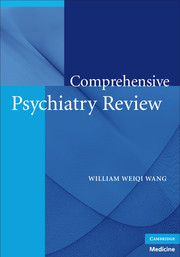Book contents
- Frontmatter
- Contents
- Introduction
- PART I INTELLECTUAL FOUNDATION OF PSYCHIATRY
- PART II EVALUATION AND MEASUREMENT
- PART III PSYCHIATRIC DISORDERS
- 10 Cognitive Disorders
- 11 Addictions: General Consideration
- 12 Addictions: Alcohol-Related Disorders
- 13 Addictions: Nonalcoholic Substance-Related Disorders
- 14 Psychotic Disorders
- 15 Mood Disorders
- 16 Anxiety Disorders
- 17 Somatoform Disorders
- 18 Dissociative Disorders
- 19 Sexual and Gender Identity Disorders
- 20 Eating Disorders and Weight Issues
- 21 Sleep Disorders
- 22 Factitious Disorders and Malingering
- 23 Personality Disorders
- 24 Child and Adolescent Psychiatric Disorders
- 25 Psychosomatic Disorders and Consultation-Liaison Psychiatry
- PART IV PSYCHIATRIC THERAPEUTICS
- PART V NEUROPSYCHIATRY AND RELEVANT NEUROLOGIC CONDITIONS
- PART VI SPECIAL TOPICS
- PART VII REVIEW QUESTIONS
- Bibliography
- Index
23 - Personality Disorders
from PART III - PSYCHIATRIC DISORDERS
Published online by Cambridge University Press: 18 January 2010
- Frontmatter
- Contents
- Introduction
- PART I INTELLECTUAL FOUNDATION OF PSYCHIATRY
- PART II EVALUATION AND MEASUREMENT
- PART III PSYCHIATRIC DISORDERS
- 10 Cognitive Disorders
- 11 Addictions: General Consideration
- 12 Addictions: Alcohol-Related Disorders
- 13 Addictions: Nonalcoholic Substance-Related Disorders
- 14 Psychotic Disorders
- 15 Mood Disorders
- 16 Anxiety Disorders
- 17 Somatoform Disorders
- 18 Dissociative Disorders
- 19 Sexual and Gender Identity Disorders
- 20 Eating Disorders and Weight Issues
- 21 Sleep Disorders
- 22 Factitious Disorders and Malingering
- 23 Personality Disorders
- 24 Child and Adolescent Psychiatric Disorders
- 25 Psychosomatic Disorders and Consultation-Liaison Psychiatry
- PART IV PSYCHIATRIC THERAPEUTICS
- PART V NEUROPSYCHIATRY AND RELEVANT NEUROLOGIC CONDITIONS
- PART VI SPECIAL TOPICS
- PART VII REVIEW QUESTIONS
- Bibliography
- Index
Summary
The word “personality” originates from the Latin “personalitas,” which in its early use referred to the fact and quality of existence as a person. The modern sense of the totality of character and temperament probably started with Carl Jung, who stated, “Personality is the supreme realization of the innate idiosyncrasy of a living being.” According to DSM-IV-TR, personality refers to the enduring pattern of inner experience and behavior.
Several terms are often interchangeably used in nonpsychiatric writing, including temperament, character, and persona. However, only “personality” pertains more to the wholeness of emotional and behavioral appeal. Temperament refers more to the inner and inherited aspect of personality. Character refers to both the inner experience and the outward behavior, which is less of the heritable pattern and more influenced by social and cultural learning. Persona refers to the outward, social image of personality. Among all these terms, only “character” suggests a sense of morality. Therefore suggestions of unhealthy temperament and deviated personality are usually more acceptable than character flaw.
Personality is generally assumed to be formed in early adulthood and relatively consistent throughout the life. However, personality modification and continuous maturation in adult life have been observed under the influence from environment, life events, learning ability, personal motivation, and many other factors. Long-term, insightoriented psychotherapy is traditionally believed to be effective for personality modification. Personality change may also be caused by general medical conditions, which is coded in Axis I in the multiaxial diagnostic formulation.
Personality disorder refers to the deviation of personality from social and cultural expectations. It is manifested in pathological patterns of cognition, affectivity, interpersonal functioning, and impulse control.
- Type
- Chapter
- Information
- Comprehensive Psychiatry Review , pp. 161 - 169Publisher: Cambridge University PressPrint publication year: 2009



